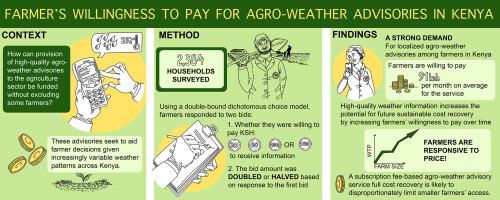Farmers’ willingness to pay for agro-weather advisories: Implications for long term support of weather information in Kenya
IF 6.1
1区 农林科学
Q1 AGRICULTURE, MULTIDISCIPLINARY
引用次数: 0
Abstract
CONTEXT
Climate information services (CIS) are an important tool for mitigation of the impact of climate change and weather variability. The pertinent CIS policy question is how to sustainably provide universal agricultural sector access.
OBJECTIVE
Farmers’ willingness to pay (WTP) for localized SMS-based agro-weather advisories is estimated, along with the factors that drive WTP, in order to identify potential tradeoffs between universal access and self-supporting service provision.
METHODS
A double-bound dichotomous choice model is employed to estimate farmers’ WTP. Primary data is collected from 2,384 Kenya farm households earmarked to receive weather advisories from a public program and merged with baseline and long-term rainfall data.
RESULTS AND CONCLUSIONS
The findings reveal a strong demand for the advisories among farmers in Kenya. However, WTP is also positively associated with farm size, raising concern that charging a fee for the advisories will disproportionately limit smaller farmers’ access. Charging the average WTP price of Ksh 91 per month would be sufficient to cover costs of agro-weather service provision. However, only half of the farmers would demand advisories at this price, whilst charging a lower price dramatically increases inclusiveness.
SIGNIFICANCE
The dilemma of how to provide financially sustainable CIS while ensuring inclusive access is playing out in Kenya’s policy environment. The Meteorological Act assures farmers free access to agro-climate information but does not identify a source of funding. Cost recovery efforts can focus on high resolution agro-weather forecasts marketed as a ‘club good’ and use extracted surplus to subsidize universal broader resolution CIS.

农民为农业天气咨询付费的意愿:对肯尼亚天气信息长期支持的影响
气候信息服务是缓解气候变化和天气变率影响的重要工具。独联体的相关政策问题是如何可持续地提供普遍的农业部门准入。目的:评估农民对本地化基于短信的农业天气预报的支付意愿(WTP),以及驱动WTP的因素,以确定普遍接入和自我支持服务提供之间的潜在权衡。方法采用双界二分类选择模型估计农户WTP。主要数据收集自2384个肯尼亚农户,这些农户被指定接收来自一个公共项目的天气预报,并与基线和长期降雨数据合并。结果和结论调查结果显示,肯尼亚农民对咨询服务有强烈的需求。然而,WTP也与农场规模呈正相关,这引起了人们的担忧,即对咨询收费将不成比例地限制小农获得咨询的机会。每月收取91肯尼亚先令的平均WTP价格足以支付提供农业气象服务的成本。然而,只有一半的农民会要求这个价格的咨询,而收取较低的价格大大增加了包容性。如何在提供财政上可持续的独联体的同时确保包容性准入的困境正在肯尼亚的政策环境中发挥作用。《气象法》保证农民可以免费获得农业气候信息,但没有确定资金来源。成本回收工作可以集中在作为“俱乐部商品”销售的高分辨率农业天气预报上,并利用提取的盈余来补贴普遍的更广泛分辨率的CIS。
本文章由计算机程序翻译,如有差异,请以英文原文为准。
求助全文
约1分钟内获得全文
求助全文
来源期刊

Agricultural Systems
农林科学-农业综合
CiteScore
13.30
自引率
7.60%
发文量
174
审稿时长
30 days
期刊介绍:
Agricultural Systems is an international journal that deals with interactions - among the components of agricultural systems, among hierarchical levels of agricultural systems, between agricultural and other land use systems, and between agricultural systems and their natural, social and economic environments.
The scope includes the development and application of systems analysis methodologies in the following areas:
Systems approaches in the sustainable intensification of agriculture; pathways for sustainable intensification; crop-livestock integration; farm-level resource allocation; quantification of benefits and trade-offs at farm to landscape levels; integrative, participatory and dynamic modelling approaches for qualitative and quantitative assessments of agricultural systems and decision making;
The interactions between agricultural and non-agricultural landscapes; the multiple services of agricultural systems; food security and the environment;
Global change and adaptation science; transformational adaptations as driven by changes in climate, policy, values and attitudes influencing the design of farming systems;
Development and application of farming systems design tools and methods for impact, scenario and case study analysis; managing the complexities of dynamic agricultural systems; innovation systems and multi stakeholder arrangements that support or promote change and (or) inform policy decisions.
 求助内容:
求助内容: 应助结果提醒方式:
应助结果提醒方式:


